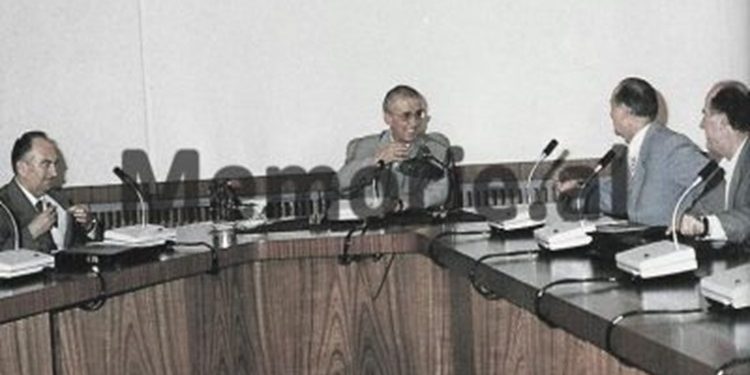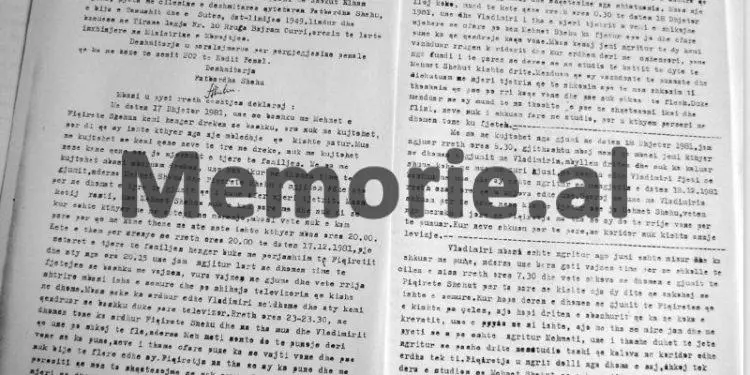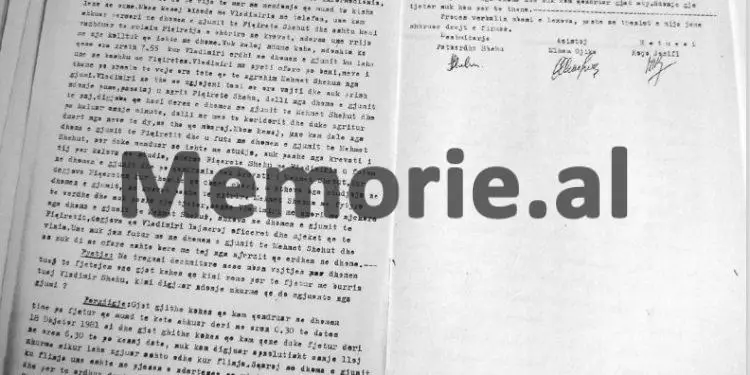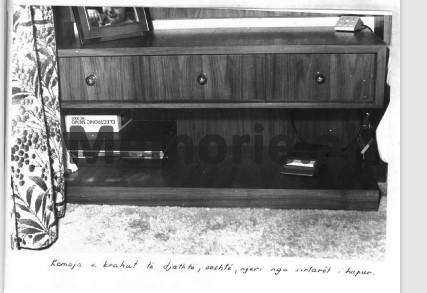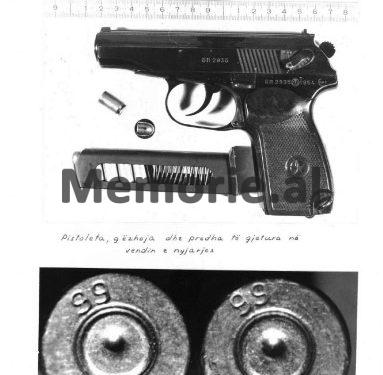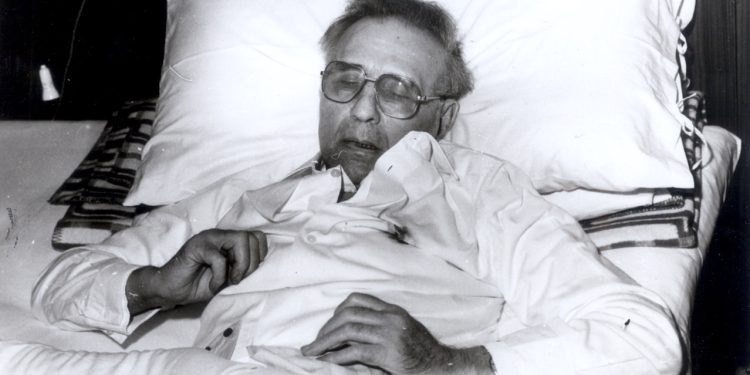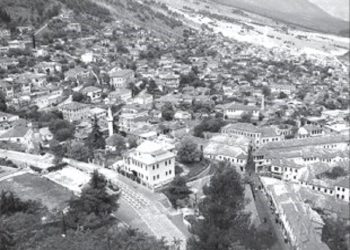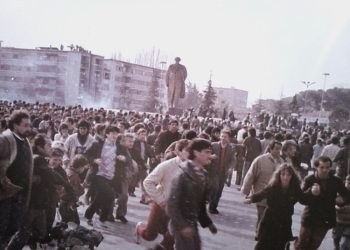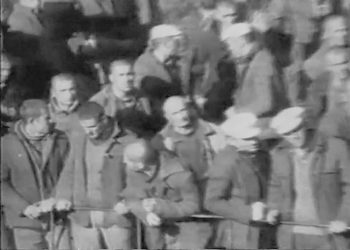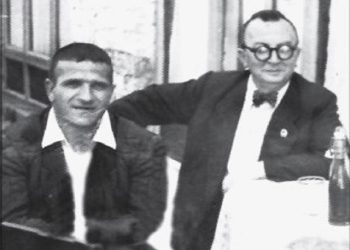From Dashnor Kaloçi
Part Eight
Memorie.al/43 years ago, as December 18, 1981 approached, the Albanian Prime Minister Mehment Shehu, who had held that position since 1953, was found dead in his bedroom (according to the official version, from a bullet “a” from a pistol) in the villa where he lived with his family, at the entrance of the “Block” for the high leadership of the PPSH, just a few meters from the building of the Central Committee of the PPSH and also Enver Hoxha’s villa. Although more than four decades have passed since that day, considered one of the most serious and scandalous events of that regime, there still isn’t a clear and accurate version of what happened to former Prime Minister Mehmet Shehu on the night as December 18, 1981 approached! However, even though after the 1990s, dozens of testimonies and archival documents regarding that event have been made public, “the murder or suicide of Mehmet Shehu” continues to be a subject of much debate and discussion, further shrouding the truth about it in mystery!
Given this fact, within the framework of publishing dozens of testimonies and archival documents from the secret fund of the former State Security and the Ministry of Internal Affairs, as well as the Central Committee of the PPSH, which we have published over these three decades following the collapse of Enver Hoxha’s communist regime and his successor, Ramiz Alia, Memorie.al has secured the voluminous file of “the enemy Mehmet Shehu,” which has been retrieved from the secret fund of the former State Security (under the Ministry of Internal Affairs), where, with some minor exceptions, most of it has never seen the light of publication and is being published for the first time.
In the file in question, there are complete documents along with the corresponding facsimiles, including the expert report from the operational-investigative group that was established immediately on the morning of December 18, 1981, led by Koço Josifi (head of the Investigation Department of the Ministry of Internal Affairs in Tirana), forensic doctors Dr. Fatos Hartito and Docent Bashkim Çuberi, as well as the Prime Minister’s doctors, Milto Kostaqi and Llesh Rroku, and the criminal expert from the Central Criminal Laboratory of the Ministry of Internal Affairs, Estref Myftari, assisted by senior officials from that ministry, Xhule Çiraku, Elham Gjika, and Lahedin Bardhi.
Additionally, in the voluminous file we are making public, there are testimonies from the family members of former Prime Minister Mehmet Shehu, service personnel, and his accompanying group, as well as all other individuals who were summoned and gave testimonies regarding that event. For more details about this, the documents in question will inform us, which we are publishing along with the corresponding facsimiles and photographs.
CONTINUED FROM THE LAST ISSUE
ARCHIVAL DOCUMENT WITH THE MINUTES OF THE INTERROGATION OF THE NURSE FROM THE SPECIAL CLINIC, VALENTINA GINA, ASSISTING THE FAMILY OF PRIME MINISTER MEHMET SHEHU, BY THE HEAD OF THE INVESTIGATION DEPARTMENT OF THE MINISTRY OF INTERNAL AFFAIRS IN TIRANA, KOÇO JOSIFI
MINUTES
(TESTIMONY)
Tirana, December 28, 1981
I, Koço Josifi, Chairman of the Investigation Department in the Ministry of Internal Affairs in Tirana, in the presence of comrade Elham Gjika, questioned citizen Valentina Gina, daughter of Qemal and Fatime, born in 1955, residing in Tirana, neighborhood No. 9, “Konferenca e Pezës” street, building 148, stairway 1, apartment 1, with a secondary education, working as a nurse in the special clinic. The witness was warned about her criminal responsibility under Article 202 of the Penal Code.
WITNESS
VALENTINA GINA
After being questioned about the matter, she declared:
“I have been working as a nurse in the house of Mehmet Shehu for about three years. My duty was to take care of the health and well-being of Bashkim Shehu’s children. Previously, there were three nurses who took care of the children of Bashkim Shehu: myself, Liljana Sallaku, and Violeta Gjolla. About a month and a half ago, one of the nurses, Liljana Sallaku, was laid off, and I was left only with Violeta Gjolla.
We usually worked 10-12 hours, but later we worked even more. On December 17, 1981, a Thursday, I arrived at work around 7:30 AM and continued working all day, and that night I slept at Mehmet Shehu’s house. Throughout the day, I stayed in the special room designated for the children, in the kitchen, and in the television room. The room where I slept with the children is on the first floor of the old building. I did not see Mehmet Shehu all day on Thursday.
On the evening of December 17, 1981, around 9:00 PM, when the film that was playing in Tirana started, I, along with Bashkim Shehu’s children, was in the workers’ room watching the movie on television.
After the movie, I put the children to sleep, went downstairs to the kitchen, had dinner around 10:30 – 11:00 PM with the worker Mimoza—whose surname I do not know, as she had just started working there. While we were together, the service officer, Dashamiri, called and asked if Mehmet Shehu had gone upstairs to the second floor. I asked the worker, and she told me that he had not gone up, and I conveyed this to the service officer over the phone. After I finished eating, around 11:00 PM, I went to the children’s room and fell asleep.
Throughout the night, I slept without any concern, and the children did not wake up until 7:30 AM. I did not get up from sleep for any reason until the next morning at 6:00 AM. After I fell asleep until I woke up at 6:00 AM on December 18, 1981, I did not hear any noise. The room where I slept with the children was on the first floor, in the corner of the old building. Whereas, the room where Mehmet slept was in the other corner of the second floor of the building. Throughout the day and night of December 17, 1981, I did not see Mehmet Shehu, nor Fiqrete Shehu.”
In Fiqrete Shehu’s room, I know that no one else slept there, except for one instance a month ago when Vladimir’s daughter, or his wife, Fatbardha, slept there. I do not know if anyone else slept in Fiqrete’s room on the night of December 17, 1981. On December 18, 1981, at 7:30 AM, the other nurse, who was to replace me, Violeta Gjolla, arrived, and I left for home at 7:40 AM. Other than that, I don’t know about the matter.
After I read the proceedings, I saw that my statements were written correctly, and I sign.
INVESTIGATOR ASSISTED
KOÇO JOSIFI ELHAM GJIKA
WITNESS
VALENTINA GINA
ARCHIVAL DOCUMENT WITH THE MINUTES OF THE INTERROGATION OF THE MINISTRY OF INTERNAL AFFAIRS OFFICER, ASTRIT VELIU, SERVING AT THE VILLA OF PRIME MINISTER MEHMET SHEHU, BY THE HEAD OF THE INVESTIGATION DEPARTMENT OF THE MINISTRY OF INTERNAL AFFAIRS IN TIRANA, KOÇO JOSIFI
MINUTES
(TESTIMONY)
Tirana, December 28, 1981
I, Koço Josifi, Chairman of the Investigation Department in the Ministry of Internal Affairs in Tirana, in the presence of comrade Elham Gjika, questioned citizen Astrit Veliu, son of Namik and Mereme, born in 1952, born in Fushë Verri of Saranda, residing in Tirana, neighborhood No. 10, “Qemal Stafa” street, building 585, stairway 4, apartment 60, an officer of the Ministry of Internal Affairs. The witness was warned about his criminal responsibility under Article 202 of the Penal Code.
WITNESS
ASTRIT VELIU
After being questioned about the matter, he declared:
I have served for about 5-6 years as an officer, assigned to guard duty in Mehmet Shehu’s building. My place of service is at the main entrance of Mehmet Shehu’s house. In fact, we refer to it as guard post No. 1. On December 17, 1981, I took over my duty at 8:00 PM, which I was scheduled to leave at 2:00 AM on December 18, 1981. While I was on duty around 8:30 PM, Mehmet Shehu arrived home, accompanied by Ali Çeno and doctor Llesh Rroku. The weather was bad, with strong winds and light rain.
There, Mehmet was escorted to the entrance door of the building by Ali Çeno and the doctor, and then he went inside. Meanwhile, Ali and the doctor returned to their place of duty. Around 9:40 PM, I noticed that one of the lights on the second floor turned off, which I knew was the bedroom and the office room, along with a small room next to them. I do not know who turned off that light. After the light was turned off, I also noticed that the shutters of the window in that room were closed. Around 10:00 PM, I observed that Mehmet Shehu opened the main entrance door on the first floor of the building. He stepped out briefly, looked outside, and then went back inside.
I heard him move the door key, apparently locking the door with the key. I continued my service normally, as I said, it was very windy and it was drizzling a bit, and I was holding an umbrella in my hand. I carried out the service while moving in front of the courtyard gate. I continued with my duties without being disturbed by anything until 2:00 AM on December 18, 1981, when officer Asim Bejo came to replace me, to whom I handed over my duties normally, and I then went home.
That same day, around 10:00 AM, I learned that Mehmet Shehu had committed suicide with a pistol in his bedroom. Of course, it struck me as surprising, and I think I did not hear the gunshot with which he took his life. As I mentioned, the weather was bad with strong winds, and I also do not know when he carried out that act. I don’t remember anything else. After I read the proceedings, I saw that my statements were written correctly, and I sign.
WITNESS ASSISTED
ASTRIT VELIU ELHAM GJIKA
INVESTIGATOR
KOÇO JOSIFI
ARCHIVAL DOCUMENT WITH THE MINUTES OF THE INTERROGATION OF THE MINISTRY OF INTERNAL AFFAIRS OFFICER, ASIM BEJO, SERVING AT THE VILLA OF PRIME MINISTER MEHMET SHEHU, BY THE HEAD OF THE INVESTIGATION DEPARTMENT OF THE MINISTRY OF INTERNAL AFFAIRS IN TIRANA, KOÇO JOSIFI
MINUTES
(TESTIMONY)
Tirana, December 29, 1981
I, Koço Josifi, Chairman of the Investigation Department in the Ministry of Internal Affairs in Tirana, in the presence of comrade Elham Gjika, questioned citizen Asim Bejo, son of Zenel and Salusha, born in 1950, born in Mazhar of Vlorë, and residing in Tirana, neighborhood No. 8, “Gjikë Kuqali” street, building 23/1, stairway 1, apartment 3, an officer of the Ministry of Internal Affairs. The witness was warned about his criminal responsibility under Article 202 of the Penal Code.
WITNESS
ASIM BEJO
After being questioned about the matter, he declared:
“I have served for about 11 years as an officer in the Ministry of Internal Affairs. As far as I remember, on December 16, 1981, my command communicated to me the order to be appointed as a service officer in the group of Mehmet Shehu. On December 17, 1981, I went to the service location assigned to me, at the entrance gate of Mehmet Shehu’s house. I spoke with my comrade who was on duty to clarify what my responsibilities would be during the service.
In fact, I spoke with officer Baki Hakrama, who was on duty that morning, and he explained to me the duties I would have while carrying out this service. The head of our group, Ali Çeno, had not given me any instructions on how to perform the service but said he would instruct me on December 18, 1981. I took over my first shift in the new position, at the main gate of the building where Mehmet Shehu lived, at 2:00 AM on December 18, 1981, and I left at 8:00 AM that same day.
When I went to take over the shift at 2:00 AM, I was careful not to make noise out front, as Mehmet Shehu had not woken up yet. Before I left for home, around 7:55, when I was with officer Baki Hakrama, I saw Ali Çeno leave quickly and enter the building of Mehmet Shehu’s house. However, I did not understand why he did this. After that, I noticed that two doctors, Llesh Rroku and Milto Kostaqi, along with Jonuz Luto, hurriedly went inside, but again I did not understand anything.
Around 8:00 AM, Jonuz Luto came outside to where we were stationed to communicate his order that no one was to be allowed to enter Mehmet Shehu’s house, without telling us why. I told him that I would leave, and after I finished my duty, I went home. I do not know what happened after that. I learned about Mehmet Shehu’s suicide at 8:00 PM when the news was announced on the radio. I have nothing else to say.
After I read the minutes, I saw that my statements were written correctly, and I sign. /Memorie.al
WITNESS ASSISTED
ASIM BEJO ELHAM GJIKA
INVESTIGATOR
KOÇO JOSIFI
CONTINUED IN THE NEXT ISSUE




